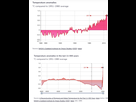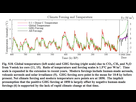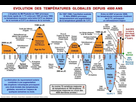Le 22 août 2019 à 00:07:17 Raijin71 a écrit :
Avec le #PrayforAmazonas sur Twitter je suis en train de m'arracher les cheveux à voir des gamins de 15 ans pleurer sur la planète mais qui iront quand même acheter leur Iphone 47 l'an prochain donc une bonne fois pour toute le réchauffement climatique est naturel MERCI DE NE PAS ESSAYER DE FAIRE CULPABILISER LES GENS.Cadeau :
C'est marrant j'ai un autre graphique 

https://www.youtube.com/watch?v=gZdunecNhEE
https://notrickszone.com/2019/09/05/new-papers-ex-noaa-climatologist-and-russian-physicists-find-human-contribution-to-warming-0-0c-0-02c/?fbclid=IwAR35aixxrUGtImREdH69kjDR-I5IcnEdFvWPsGn0Wj05-grr5KR6apBJXSc
https://arxiv.org/pdf/1907.00165.pdf?fbclid=IwAR2NleP0TCphv7ADcqco1Vihl3l43mgz3U_qlgxCIN_UheLLBaC5qjq8acA
Le 22 août 2019 à 22:14:56 SacrificeUltime a écrit :
Le 22 août 2019 à 00:07:17 Raijin71 a écrit :
Avec le #PrayforAmazonas sur Twitter je suis en train de m'arracher les cheveux à voir des gamins de 15 ans pleurer sur la planète mais qui iront quand même acheter leur Iphone 47 l'an prochain donc une bonne fois pour toute le réchauffement climatique est naturel MERCI DE NE PAS ESSAYER DE FAIRE CULPABILISER LES GENS.Cadeau :
C'est marrant j'ai un autre graphique
Nasa donc non recevable ![]()
+1
Le 22 août 2019 à 00:07:17 Raijin71 a écrit :
Avec le #PrayforAmazonas sur Twitter je suis en train de m'arracher les cheveux à voir des gamins de 15 ans pleurer sur la planète mais qui iront quand même acheter leur Iphone 47 l'an prochain donc une bonne fois pour toute le réchauffement climatique est naturel MERCI DE NE PAS ESSAYER DE FAIRE CULPABILISER LES GENS.Cadeau :
Gneugneugneu le réchauffement est naturel...
Même en admettant cela, est-ce une raison pour saccager notre seul habitat dans cet univers ? ![]()
Le réchauffement climatique est chronique mais c'est pas une raison de toute détruire.
Une liste des associations scientifiques ayant pris position sur le réchauffement climatique:
https://climate.nasa.gov/scientific-consensus/
Prises de position des académies des sciences de différentes nations (Russie, USA, Allemagne, France, Chine etc.)
https://www.nationalacademies.org/includes/climatechangestatement.pdf
https://www.academie-sciences.fr/archivage_site/activite/rapport/avis0605a_gb.pdf
Argumentaire de la société américaine de géologie:
https://www.geosociety.org/gsa/positions/position10.aspx
Scientific advances have greatly reduced previous uncertainties about recent global warming. Ground-station measurements have shown a warming trend of ~0.85 °C since 1880, a trend consistent with (1) retreat of northern hemisphere snow and Arctic sea ice; (2) greater heat storage in the ocean; (3) retreat of most mountain glaciers; (4) an ongoing rise in global sea level; and (5) proxy reconstructions of temperature change over past centuries from archives that include ice cores, tree rings, lake sediments, boreholes, cave deposits, and corals. Both instrumental records and proxy indices from geologic sources show that global mean surface temperature was higher during the last few decades of the 20th century and the first decade of the 21st than during any comparable period during the preceding four centuries (National Research Council, 2006). Earth’s surface has been successively warmer in each of the last three decades and each of those has been warmer than any decade since 1850. The period from 1983 to 2012 is likely the warmest 30 years in the northern hemisphere during the last 1,400 years (IPCC, 2013). This recent warming of Earth’s surface is now consistently supported by a wide range of measurements and proxies, including land- and satellite-based measurements.
The geologic record contains unequivocal evidence of former climate change, including periods of greater warmth with limited polar ice, and colder intervals with more widespread glaciation. These and other changes were accompanied by major shifts in species and ecosystems. Paleoclimatic research has demonstrated that these major changes in climate and biota are associated with significant changes in climate forcing, such as continental positions and topography, patterns of ocean circulation, the greenhouse gas composition of the atmosphere, and the distribution and amount of solar energy at the top of the atmosphere caused by changes in Earth’s orbit and the evolution of the sun as a main sequence star. Cyclic changes in ice volume during glacial periods over the last three million years have been correlated to orbital cycles and changes in greenhouse gas concentrations, but may also reflect internal responses generated by large ice sheets. This rich history of Earth’s climate has been used as one of several key sources of information for assessing the predictive capabilities of modern climate models. The testing of increasingly sophisticated climate models by comparison to geologic proxies is continuing, leading to refinement of hypotheses and improved understanding of the drivers of past and current climate change. Climate models have improved continuously and now reproduce observed continental-scale warming patterns over multiple decades (IPCC, 2013).
Given the knowledge gained from paleoclimatic studies, several explanations for the ongoing warming trend can be eliminated. Changes in Earth’s tectonism and its orbit are far too slow to have played a significant role in the observed rate of temperature increase over the last 150 years. At the other extreme, large volcanic eruptions have cooled global climate for a year or two, and El Niño episodes have warmed it for about a year, but neither factor dominates longer-term trends. Extensive efforts to find any other natural explanation for the recent trend have similarly failed.
As a result, greenhouse-gas concentrations and solar output are the principal remaining factors that could have changed rapidly enough and lasted long enough to explain the observed changes in global temperature. The 5th IPCC report (2013) concluded that solar irradiance changes contributed only a few percent to changes in radiative forcing of the atmosphere over the past century. Throughout the era of satellite observation, during periods of strong warming, the data show little evidence of increased solar influence (Foster and Rahmstorf, 2011; Lean and Rind, 2008).
Greenhouse gas concentrations remain the major explanation for the warming. Observations and climate model assessments of the natural and anthropogenic factors responsible for this warming conclude that rising anthropogenic emissions of greenhouse gases have been an increasingly important contributor since the mid-1800s and the major factor since the mid-1900s (Meehl et al., 2004). The CO2 concentration in the atmosphere is now ~40% higher than peak levels measured in ice cores spanning 800,000 years of age, and the methane concentration is 1.5 times higher (IPCC, 2013). The measured increases in greenhouse gases are more than enough to explain the observed global temperature increase at Earth’s surface. In fact, considered in isolation, the greenhouse gas increases during the last 150 years would have caused a warming larger than that actually measured, but mechanisms that limit increases in near-surface air temperatures from aerosols, ocean heat storage, and possibly clouds have offset part of the warming. In addition, because the oceans take decades to centuries to respond fully to climatic forcing, the climate system has yet to register the full effect of recent greenhouse gas increases.
These advances in scientific understanding of recent warming form the basis for projections of future changes. If greenhouse-gas emissions follow a likely trajectory with little to no effort to stabilize emissions (IPCC, 2013, RCP 8.5), by 2100 atmospheric CO2 concentrations will reach four times pre-industrial levels, for a total warming of 2.6 °C to 4.8 °C compared to 1850. Even under scenarios that take into account efforts to stabilize emissions, expected increases in global mean temperature exceed 2 °C by the year 2100. The likely changes in greenhouse gas concentrations and temperature would substantially alter the functioning of the planet in many ways. The projected changes involve the following risks to humans and other species: (1) continued shrinking of Arctic sea ice, with effects on native cultures and ice-dependent biota; (2) less snow accumulation and earlier melt in mountains, with reductions in spring and summer runoff for agricultural and municipal water; (3) disappearance of mountain glaciers and their late-summer runoff; (4) increased evaporation from farmland soils and stress on crops; (5) greater soil erosion due to increases in heavy convective summer rainfall; (6) longer fire seasons and increases in fire frequency; (7) severe insect outbreaks in vulnerable forests; (8) acidification of the global ocean; and (9) fundamental changes in the composition, functioning, and biodiversity of many terrestrial and marine ecosystems. In addition, melting of Greenland and West Antarctic ice (still highly uncertain as to amount), along with thermal expansion of seawater and melting of mountain glaciers and small ice caps, will cause substantial future sea-level rise, affecting densely populated coastal regions, inundating farmlands, and dislocating large populations (Melillo et al, 2014; IPPC, 2013). Because large, abrupt climatic changes occurred within spans of just decades during previous ice-sheet fluctuations, the possibility exists for rapid future changes as ice sheets become vulnerable to enhanced global warming associated with the greenhouse gas increases. Finally, carbon-climate model simulations indicate that 15%–40% of the anthropogenic CO2 “pulse” could stay in the atmosphere for longer than a thousand years, extending the duration of fossil-fuel warming and its effects on humans and other species. The acidification of the global ocean and its effects on ocean life are projected to last for tens of thousands of years and, on the basis of documented climate changes in the past, lead to extinction of species.
Un peu de connaissances scientifiques ne feraient pas de mal à l'auteur (en plus c'est en français):
Partie 1: https://www.youtube.com/watch?v=gqa-2RQ9eZ8
Partie 2: https://www.youtube.com/watch?v=V4nyyhs3fnc
1) Oui le réchauffement est un processus naturel, personne ne dit le contraire. Seulement, il est fortement accéléré
2) Ce n'est pas la "planète" qu'on tue, mais notre propre espèce à terme
Oui le réchauffement est un processus naturel
En réalité, il devrait naturellement se refroidir.

![]()
Une vidéo de vulgarisation scientifique sur le sujet : https://www.youtube.com/watch?v=R6eywXdssMw
